KENTUCKY DEPARTMENT OF CORRECTIONS
EASTERN KENTUCKY CORRECTIONAL COMPLEX
West Liberty, KY
The Journeymen Program

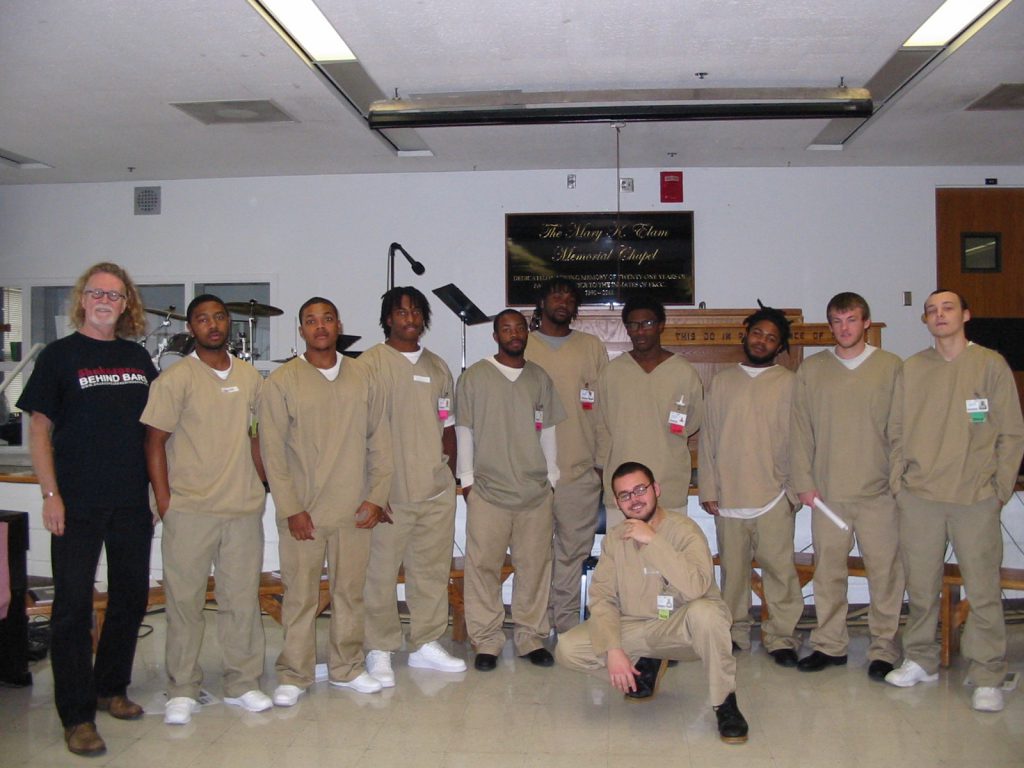
A program specifically designed for 18-21 year-old inmates incarcerated in the Kentucky Department of Corrections.
The Journeymen program embraces the mission, vision, and values of Shakespeare Behind Bars.
The Journeymen program brings self-selected 18-21 year-old inmates together with an SBB facilitator, a group of senior mentors (alumni of the SBB program at the Luther Luckett Correctional Complex), and, when available, junior mentors (alumni of the Journeymen program) to work together in a sequential series of workshops over an agreed upon period of time unique to the hosting correctional institution. The program culminates in a final sharing with a potential audience composed of Kentucky Department of Corrections officials, prison staff, prison inmates, and invited guests from the inmate participant’s KY DOC approved visitors list.
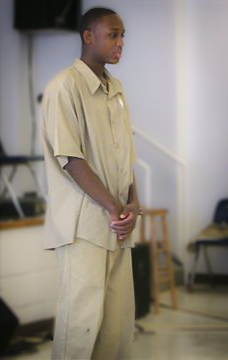 Each participant completing the program is presented with a Certificate of Completion, a Journeymen logo t-shirt, and a graduation photograph.
Each participant completing the program is presented with a Certificate of Completion, a Journeymen logo t-shirt, and a graduation photograph.
Past Journeymen Program participants have exhibited improved:
- comprehension, literacy (reading, writing, and oral communication), and critical thinking skills;
- self-esteem and positive self-image;
- social and communication skills;
- decision making, problem-solving, and creative thinking skills;
- empathy, compassion, and trust;
- responsibility as a member of a group;
- responsibility in daily life and for crime/s committed;
- tolerance and peaceful resolution of conflict skills;
- ability to relate the themes contained in Shakespeare’s works to themselves and society.
In 2014, SBB Founder Curt L. Tofteland assisted by three SBB senior mentors and one mentor worked with four 18-21 year-old inmates. As a culmination of their work, the ensemble shared monologues and a spoken word poem written by a senior mentor for an audience of staff and education inmates in the chapel.
On October 16, 2015, SBB Founder Curt L. Tofteland assisted by two SBB senior mentors and five SBB junior mentors worked with three 18-22 year-old prisoners. As a culmination of their work, the ensemble shared Shakespeare monologues and sonnets plus original spoken word poems written by the journeymen for an audience of staff and education inmates in the chapel.
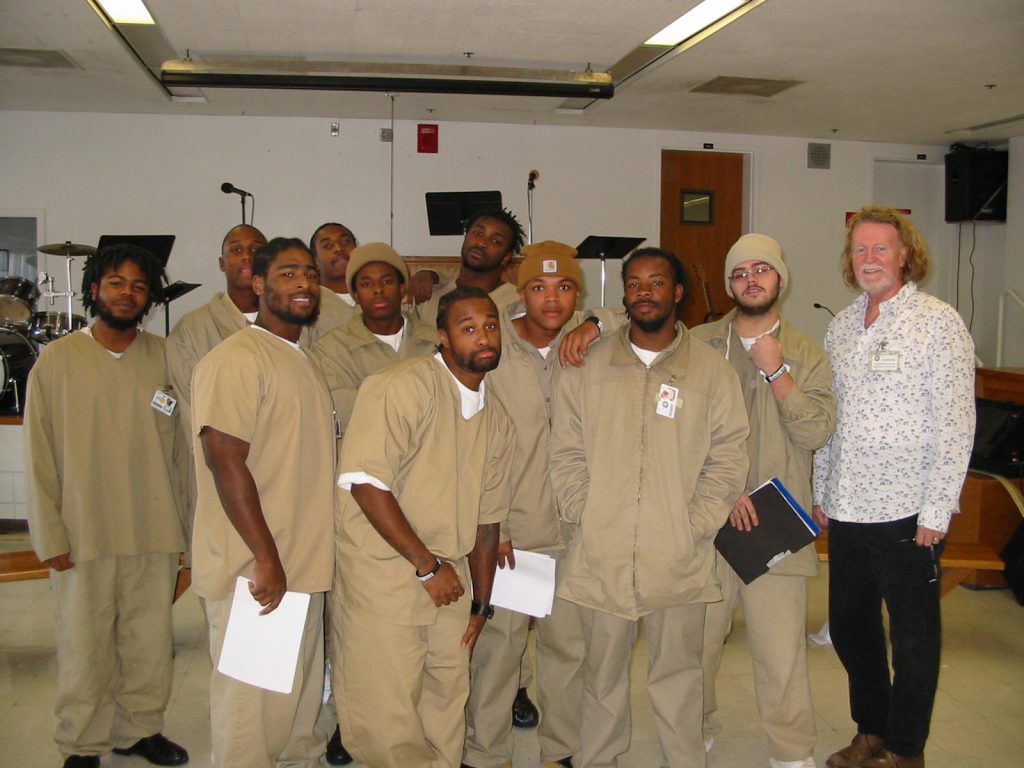
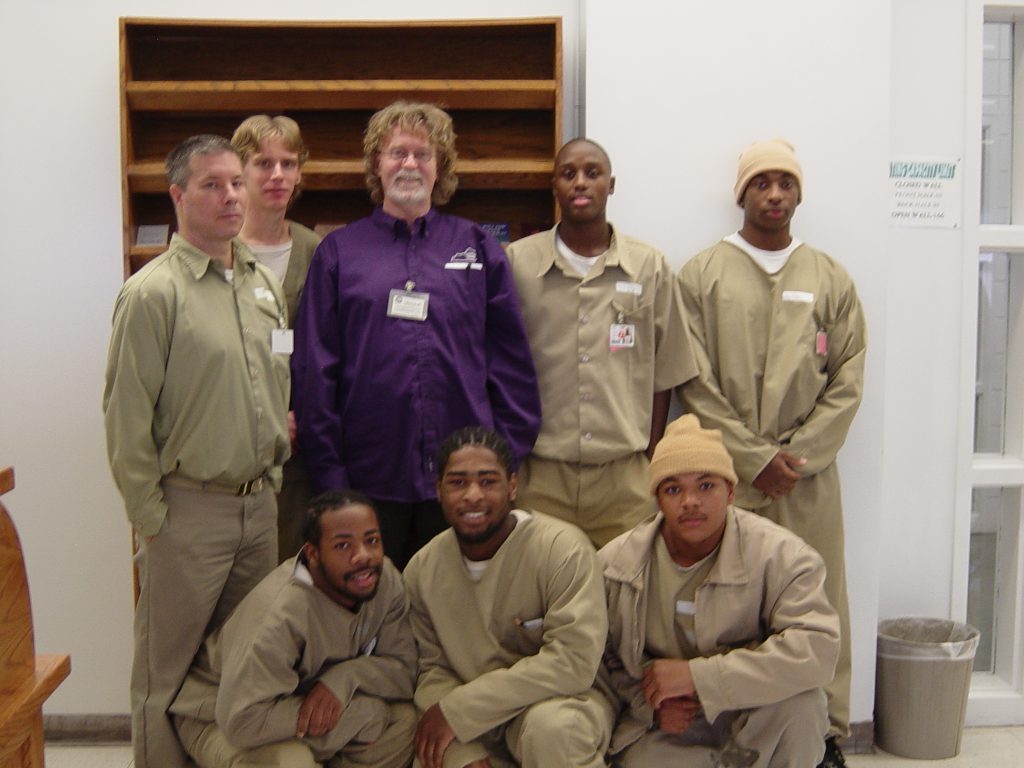
This program is made possible through the generosity of Arts for All Kentucky and the Kentucky Department of Education.
![]()
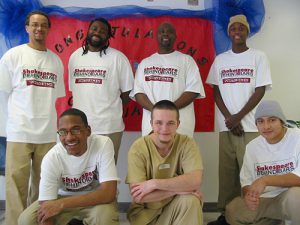
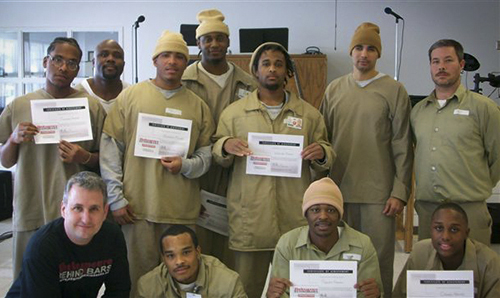
Shakespeare Behind Bars Journeymen Program at Eastern Kentucky Correctional Complex
Journeymen Apprentice Participant Comments:
“What I know about this Shakespeare program is that it can help you mentally and physically strong. Most of the monologues I read in the Shakespeare programs had common things in them that I have in me. Being in this program helped change part of myself. Shakespeare is the growth of becoming a man. It really learned a lot with activities and listening to others, also in observing and communicating.”
“What I learned out of Shakespeare Behind Bars is it don’t matter where you came from or what crime you committed. It shows you a different way of handling things in life instead of taking the short cut. Being in this program helps teens and they should get this program in every prison and juvenile facility.”
“What I learned from this class was to always try something new and also keep on trying to overcome the things that come into my life. This class has made me think about everything in life and to find new ways to go about each and every thing. One of the things I like most about the time is how we came together as one and helped each other out. I just want to do more and I hope I will have a chance to do it once more.”
“I think that this program is a good one for young people to learn. I got out of this how to work with people and do things. This right here will help others get on the right track of mind. This helped me by knowing that every day I knew I had something to do or somewhere to go.”
“First and foremost, I would like to thank Mr. Wallace for taking the time out to deal with a group of young and aggressive young men. Thank you. I would also like to add that I have been the recipient of such wonderful things like being able to communicate without actually speaking. Learning that Shakespeare is one helluva playwright/poet. Finally, I would like to add that during this past week we’ve learned a lot and enjoyed myself.”
“What I have received out of this SBB program is a better perspective out of life. I got a new technique for memory building. I’m still digging deep inside to find some sadness is me as opposed to anger. I would love to participate in future productions of SBB!”
“What I have been learning about in this class is how to pass energy and working together. You can get real."
"I want to thank you for coming down here and showing me a new way to express myself. I never thought in my life that I would open up to strangers and especially crying in front of them. But for some reason, in our circle, I felt comfortable and I wouldn’t be judged. You helped me to communicate better."
"Because of my experience in the Journeymen program, I am hoping you (EKCC Director of Education) could help me get into something to help make my time go by and be productive."
SBB Senior Mentor Participant Comments:
"Shakespeare Behind Bars is a circle of trust where we come together and share the differences of our ethnicity through the telling of our experiences one to the other, openly and honestly in an attempt or effort of self-discovery. SBB is all about openness and one’s willingness to take the risk of being a failure - a process we undergo every time we take to the stage. But more importantly, it’s about the ability to look at one’s failures and shortcomings . . . It’s about establishing confidence in one’s self and others. SBB is all about self-discovery and the overcoming of one’s fears via self-exploration, a process which gives one not only in touch with his Shakespeare character but also the character of oneself . . . I discovered through this year’s gathering that is is okay to laugh at yourself. This process has taught me humility."
"I just wish we’d had more than 5 days. The work is so uplifting. It’s a shame that it has to be done on such a small scale . . . I can’t tell you how many people (inmates) have asked about the program. So many want to participate, want to learn, want to grow but are restricted because of the 18-21 year-old age limit . . . I love what you do and the message you send. You give us all confidence to say we are not what society has labeled us. We will continue the challenge of helping today’s youth. Just know the message is heard by all, young and old."
"As a Senior Mentor, the process for me was to help mentor the younger ones in a certain direction. I believe everyone wants to get to that place of peace, healing, and positive direction but everyone needs a guide and much practice."
"The Shakespeare program is more than just an exercise of recitation. It is a therapy for inmates and allows individuals the opportunity to explore not only who they are but what their capabilities are . . . It teaches that the journey into self is the never ending trip that constantly evolves. It also shows us that we don’t have to use our crime as a crutch or excuse, but instead as a counterweight to propel an individual forward and motivate the youth to not follow the paths that we have taken. The youth of today are the future of tomorrow. So, ultimately, as we act as journeymen and mentors to these children, who are young, first-time felons 18-21 years-old, and who still have a chance at life after this prison bit, there’s a sense of fulfillment and opportunity for us to give back and begin the road to reconstructing some of the destruction that we have contributed to . . . This program also breaks down racial gender and class barriers and gives a non-violent approach to situations that occur in life."
“The group dynamics have brought about a positive atmosphere and great moments of self-reflection. I was blessed to be a part of someone else’s growth and desire to want to know and be more. I think if this project would have at least a month, it will help to save more lives which in turn will help save lives.”
“Doing the SBB Journeymen Program has given me an opportunity to learn more about the youth of today. I have a real desire to bring about change (break the cycle) and through this experience seeing the growth has allowed me to see that the Journeymen Program is that THING which can bring about that growth. “
“I found the program to be very positive, even though it targeted younger guys, I found it refreshing to see that they had goals, and were willing to work for those goals. To be committed to something says something about one’s character. I watched a group of young guys commit to a process and trust in that process. That is something you don’t normally see out of this age group in prison.”
Junior Mentor Participant Comments:
"I learned that a lot of good could come from a group of guys who society views as BAD. We are not bad people. We’ve just made some terrible mistakes. If we were granted the opportunity, we would do things a lot different . . . I doesn’t matter how old or young you are, you can learn from anybody . . . I thought it was positive how much Shakespeare is much like the times now."
"I learned to open to people that I barely knew . . . Journeymen program taught me how to make my time incarcerated easier. This is because there were people in class that got life or most of their life taken from them, but they came to Shakespeare class . . . it helps to motivate me to get out and be a productive member of society."
"This program had really set me on a path to true self and I’m looking forward to participating when I go home very soon . . . The exercises each morning had everyone in sync and ready to include themselves . . . I also appreciated the testimonials that were given by the elders . . . Shakespeare Behind Bars is a very relevant and influential program.
"For me it was a very positive experience. In an environment where is there is so much negative, it’s very refreshing to be around a group that is about being positive . . . It’s a shame the program is only 5 days . . . seeing younger guys trying to grow, trying to change, trying to re-shape their way of thinking, this helps me want to continue my growth."
![]()
November 2013 SBB|EKCC Journeymen Program Outcomes
Journeymen Participants:
• improved and developed comprehension, literacy (reading, writing, and oral communication), and critical thinking skills;
• increased self-esteem and develop a positive self-image;
• developed and improved social and communication skills;
• developed decision making, problem-solving, and creative thinking skills;
• developed empathy, compassion, and trust;
• took more responsibility in daily life and for crime committed;
• became a responsible member of a group;
• learned tolerance and peaceful resolution of conflict;
• related themes contained in Shakespeare's works to themselves and society.
• communicated ideas and information to different audiences for different purposes;
• actively created theatre and performances and expressed emotion through character;
• employed conflict resolution skills learned through diffusing potential physical altercations during rehearsal;
• developed empathy through playing a character and looking at things from another’s perspective;
• made sense of ideas and communicated ideas;
• analyzed their own and others' artistic products and performances through daily feedback sessions;
• learned to stay on a task while heightening frustration tolerance;
• improved concentration through performing monologues;
• learned about careers in the arts through dialogue with facilitators and witnessing various artists’ work.
*Approximately 50% of the Journeymen and audience had developmental learning challenges.


